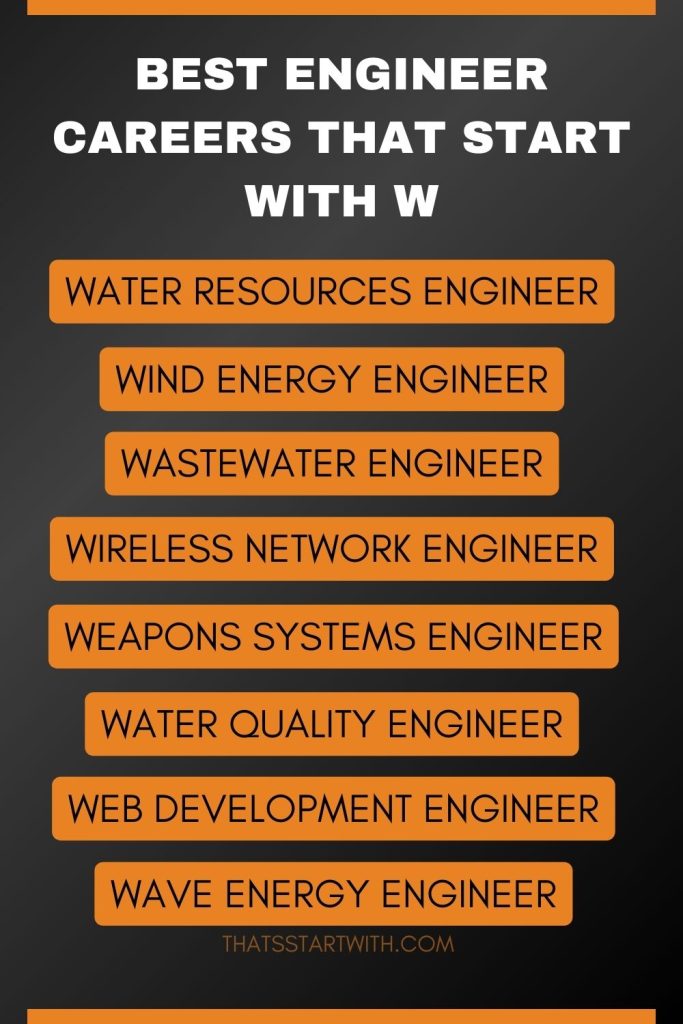
Embarking on a career in engineering opens up a world of opportunities, and for those intrigued by the letter “W,” a diverse array of Engineer Careers awaits. Engineers play a pivotal role in designing, creating, and optimizing solutions that shape our modern world.
The Engineer Careers That Start With W encompass a broad spectrum of specialties, each contributing to the advancement of technology, infrastructure, and innovation. From harnessing the power of wind to exploring the depths of water-related engineering, these careers not only demand technical expertise but also a passion for problem-solving and a commitment to improving society.
In this exploration of Engineer Careers That Start With W we delve into the exciting realms of engineering where professionals work tirelessly to address challenges, push boundaries, and build a future that is both sustainable and cutting-edge.
Engineer Careers That Start With W

Water Resources Engineer:
Water resources engineers manage, design, and optimize water-related projects, including dams, reservoirs, and irrigation systems, to ensure sustainable water management and distribution.
Wind Energy Engineer:
Wind energy engineers focus on harnessing the power of wind to generate electricity. They design, develop, and optimize wind turbine systems and contribute to the growth of renewable energy.
Wireless Communication Engineer:
Wireless communication engineers specialize in designing and optimizing wireless communication systems, including cellular networks, satellite communication, and Wi-Fi, to enhance connectivity and communication.
Wastewater Engineer:
Wastewater engineers work on the treatment and management of wastewater to protect the environment and public health, ensuring the safe disposal or reuse of water.
Wireless Network Engineer:
Wireless network engineers design and maintain wireless networks, ensuring seamless connectivity and efficient data transmission in various settings, from homes to large enterprises.
Water Treatment Engineer:
Water treatment engineers focus on developing and implementing processes to purify and treat water for human consumption, industrial use, and environmental protection.
Weapons Systems Engineer:
Weapons systems engineers contribute to the design and development of military weapons, ranging from firearms to sophisticated missile systems.
Wind Turbine Design Engineer:
Wind turbine design engineers specialize in creating and optimizing the aerodynamics and structural aspects of wind turbines to maximize energy conversion efficiency.
Water Quality Engineer:
Water quality engineers monitor and improve the quality of water in natural systems, ensuring compliance with environmental standards and regulations.
Web Development Engineer:
Web development engineers design and create websites, web applications, and online platforms, employing programming languages and technologies to enhance user experiences.
Well Drilling Engineer:
Well drilling engineers design and implement drilling processes for extracting groundwater or oil and gas, ensuring the efficient and safe extraction of resources from underground reservoirs.
Wave Energy Engineer:
Wave energy engineers explore and develop technologies to harness energy from ocean waves, contributing to the growth of sustainable and renewable energy sources.
Waterfront Structural Engineer:
Waterfront structural engineers focus on designing and maintaining structures along waterfronts, such as ports, piers, and seawalls, to withstand environmental forces and ensure stability.
Welding Engineer:
Welding engineers specialize in the application of welding techniques to join materials, ensuring the integrity and strength of structures in various industries, from construction to manufacturing.
Workstation Engineer:
Workstation engineers design and manage computer workstations, ensuring optimal performance, security, and functionality for users in diverse professional settings.
Wind Farm Engineer:
Wind farm engineers oversee the development, construction, and maintenance of wind farms, managing multiple wind turbines to maximize energy production.
Water Distribution Engineer:
Water distribution engineers design and manage systems for the efficient and reliable distribution of water to homes, businesses, and industries.
Waterfront Development Engineer:
Waterfront development engineers contribute to the planning and construction of waterfront areas, integrating infrastructure, recreation, and environmental considerations.
Water Resources Planning Engineer:
Water resources planning engineers focus on strategic planning to manage water availability, usage, and conservation, addressing long-term water resource challenges.
Wildlife Habitat Engineer:
Wildlife habitat engineers work on projects that balance human development with the preservation and enhancement of natural habitats for diverse wildlife species.
Wireline Engineer:
Wireline engineers specialize in well intervention services in the oil and gas industry, deploying tools and instruments downhole to assess and optimize well performance.
Warping Engineer:
Warping engineers are involved in the textile industry, focusing on the process of warping, which involves arranging yarns on a loom for the efficient and precise weaving of fabrics.
Wine Production Engineer:
Wine production engineers contribute to the winemaking process, optimizing fermentation, filtration, and bottling techniques to ensure the quality and consistency of wine products.
Waterfront Civil Engineer:
Waterfront civil engineers manage civil infrastructure projects along coastlines and water bodies, including bridges, roads, and utilities, considering environmental and navigational factors.
Wearable Technology Engineer:
Wearable technology engineers design and develop devices that can be worn on the body, such as smartwatches and fitness trackers, integrating technology seamlessly into daily life.
Wood Engineering:
Wood engineers specialize in the design and optimization of structures using wood as a primary material, considering both aesthetic and structural properties.
Water Supply Engineer:
Water supply engineers focus on designing, developing, and managing systems for sourcing, treating, and distributing clean water to communities and industries.
Wind Energy Project Manager:
Wind energy project managers oversee the planning, execution, and completion of wind energy projects, ensuring they meet timelines, budgets, and regulatory requirements.
Waterfront Environmental Engineer:
Waterfront environmental engineers assess and address environmental impacts associated with waterfront development projects, ensuring sustainable practices and compliance with regulations.
Welding Inspection Engineer:
Welding inspection engineers specialize in ensuring the quality and safety of welded structures through rigorous inspection and testing processes.
Winery Process Engineer:
Winery process engineers focus on optimizing the production processes in winemaking, from grape crushing to bottling, to enhance efficiency and product quality.
Wind Turbine Maintenance Engineer:
Wind turbine maintenance engineers are responsible for the ongoing inspection, maintenance, and repair of wind turbine components to ensure their continued performance and reliability.
Waterproofing Engineer:
Waterproofing engineers specialize in developing and implementing techniques to protect structures from water intrusion, ensuring durability and longevity.
Waste-to-Energy Engineer:
Waste-to-energy engineers work on projects that convert waste materials into usable energy, contributing to sustainable waste management practices.
Wastewater Treatment Plant Engineer:
Wastewater treatment plant engineers oversee the design, operation, and maintenance of facilities that treat sewage and industrial wastewater.
Wind Energy Resource Assessment Engineer:
Wind energy resource assessment engineers evaluate and analyze wind patterns at potential wind farm sites to optimize turbine placement for maximum energy output.
Wood Processing Engineer:
Wood processing engineers focus on the efficient and sustainable processing of wood materials for various applications, including construction and manufacturing.
Warehouse Automation Engineer:
Warehouse automation engineers design and implement automated systems in warehouses, optimizing logistics and improving overall efficiency in inventory management.
Waterway Transportation Engineer:
Waterway transportation engineers focus on designing and optimizing transportation systems on water, such as canals and navigational channels, to facilitate efficient shipping and navigation.
Wind Turbine Control Systems Engineer:
Wind turbine control systems engineers specialize in designing and implementing control systems for wind turbines, optimizing their performance and response to changing wind conditions.
Related Articles:
- Engineer Careers That Start With T
- Engineer Careers That Start With U
- Engineer Careers That Start With V
Conclusion
Engineer Careers That Start With W encompass a wide range of specialties that contribute to the dynamic landscape of engineering. From harnessing the power of wind to managing water resources, these careers showcase the diversity and innovation inherent in the field.
Engineers beginning their journey in these professions not only find themselves at the forefront of technological advancements but also play a crucial role in addressing global challenges, from sustainable energy production to water conservation and environmental protection.
As we’ve explored the diverse realms of water resources, wireless communication, and beyond, it becomes evident that each career represents a unique intersection of expertise, creativity, and problem-solving.
Whether it’s the meticulous planning of a waterfront development, the optimization of wind turbines for energy efficiency, or the design of wireless networks for seamless communication, engineers with a penchant for the letter “W” find themselves at the heart of transformative endeavors.
Greetings, I’m Andrew Miller, and I’ve initiated this blog to assist individuals in discovering a wide range of things alphabetically, from A to Z.